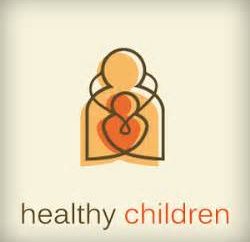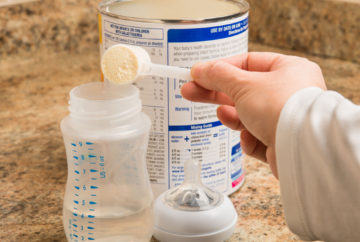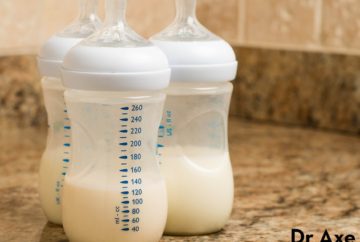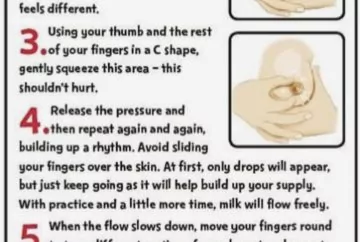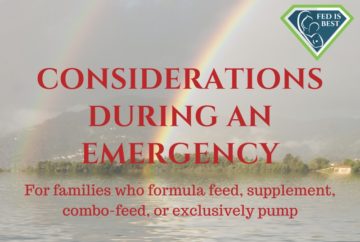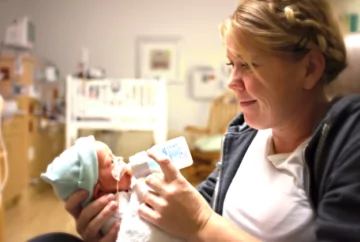Safe Infant Feeding and Maternal Mental Health
Welcome to our infant feeding Educational resources page!
Here, you’ll find a variety of materials intended to support you in best feeding your newborn and some materials to help your clinicians best support you in doing so. Please check back from time to time as we’re working to expand this section to include comprehensive feeding information for all types of feeding plans – breastfeeding, formula feeding, pumping, bottle, tube, syringe, and cup feeding too.
We are proud to say the Fed Is Best Foundation is committed to educating and supporting parents in choosing the right feeding options for their babies while protecting their mental well-being.
Click below for more information, and please check back from time to time, as we’ll be adding information regularly.

Click here: WHY FED IS BEST: FROM ONE THERAPIST’S POINT OF VIEW.
Disclaimer: This resource page does not replace in-person physician evaluation and treatment. It is meant to inform parents of the most recent data regarding infant feeding and to increase their knowledge on how to protect their newborns from hyperbilirubinemia, dehydration, hypernatremia, hypoglycemia, and extended or repeat hospitalizations due to complications from underfeeding. Earlier supplementation may be needed for babies who are premature or have medical conditions. It is recommended that a parent seek evaluation by a physician trained in newborn care for any concerns regarding the health and safety of her baby if they arise.
Fed is Best Feeding Plan – Updated 2024
Updated February 1, 2024 We are proud to present the latest edition of the Fed is Best Guide to Safe and Optimal Infant Feeding. The feeding plan helps you decide and communicate how you would like to feed your newborn infant after birth and what you would like to do in case feeding problems and … Continue reading Fed is Best Feeding Plan – Updated 2024
Guide to Formula Feeding From Healthychildren.org
powered by the American Academy of Pediatrics: Amount and Schedule of Formula Feedings After the first few days, your formula-fed newborn will take from 2 to 3 ounces (60–90 ml) of formula per feeding and will eat every three to four hours on average during her first few weeks. (Breastfed infants usually take smaller, more … Continue reading Guide to Formula Feeding From Healthychildren.org
NYT Parenting: How to Breastfeed in the First 2 Weeks of Life
Our very own Co-Founder, Jody Segrave-Daly, was invited by the New York Times to write a safe, evidence-based, balanced guide to breastfeeding for their new New York Times Parenting page. Here is her amazing guide to breastfeeding the first two weeks of life.
A Brief History of Infant Formula
by Dr. Chad Hayes, Pediatrician and blogger, Chadhayesmd.com In the beginning, there was breastfeeding…and that was pretty much it. If that didn’t work out, your baby died. Apparently, some people find infant mortality objectionable, so over the past several thousand years, we’ve come up with other solutions. And, given the number of women who died … Continue reading A Brief History of Infant Formula
Daily Milk Calculator for Infants – How Much Breast Milk and/or Formula Does My Baby Need?
The following is a tool to help calculate your infant’s daily milk requirement to maintain their body weight plus what they need for growth, whether they are fed breast milk, formula or both. The calculator uses the daily energy requirement of infants published by the Food and Agriculture Organization/World Health Organization/ United Nations University (FAO/WHO/UNU) upon which … Continue reading Daily Milk Calculator for Infants – How Much Breast Milk and/or Formula Does My Baby Need?
A Formula for Success: The Ultimate Guide to Infant Formulas
By Dr. Chad Hayes, pediatrician, Blogger chadhayesmd.com Maybe breastfeeding didn’t work out for you. Or maybe it was going well until you went back to work. Maybe you were never really interested. Whatever that case, you’ve decided to feed your baby formula. You don’t have to apologize, feel guilty, or justify your reasons to anyone. … Continue reading A Formula for Success: The Ultimate Guide to Infant Formulas
A Formula for Success: The List (a comparison of commercial infant formulas)
By Dr. Chad Hayes, Pediatrician and Blogger Chadhayesmd.com This is an extensive list of commercial infant formulas, along with a brief description of each. This list is meant to be used in conjunction with A Formula for Success: The Ultimate Guide to Infant Formulas. If you haven’t read it yet, please do; this list will … Continue reading A Formula for Success: The List (a comparison of commercial infant formulas)
The Newborn Stomach Size Myth: It is NOT 5-7 mL
Written by Jody Segrave-Daly, RN, IBCLC As a veteran NICU, nursery nurse, and lactation consultant, I have cared for and fed thousands of babies over the past 30 years. When working in the special care nursery, babies are fed according to their weight and cumulative losses to determine their caloric requirements for intake amounts and … Continue reading The Newborn Stomach Size Myth: It is NOT 5-7 mL
Know Your Risks for Delayed Onset of Full Breast Milk Supply
Mothers are taught that it is rare to have insufficient breast milk. But research shows delayed milk production affects at least 1 in 5 women in the first days of an infant’s life, which puts her child at risk of dehydration and underfeeding from exclusive breastfeeding. These complications can result in jaundice, low blood sugar, … Continue reading Know Your Risks for Delayed Onset of Full Breast Milk Supply
Starvation Jaundice: Risk Factors and Prevention
Here is an downloadable infographic on the risk factors that predict development of jaundice from underfeeding of breastfed newborns. Please feel free to download and print to take with you, to hand out to patients or to post in your health facility. We believe all babies deserve to be protected from hunger and thirst every … Continue reading Starvation Jaundice: Risk Factors and Prevention
Manual Expression of Breast Milk Video Instruction From Stanford Medicine
This is a very useful instructional video on hand expression of breast milk presented by Stanford Medicine. Hand expression can be used to confirm the present of colostrum before the first breastfeeding session and at every session thereafter. It can be done while nursing to help moms empty their breasts of colostrum/milk and to help … Continue reading Manual Expression of Breast Milk Video Instruction From Stanford Medicine
Why Fed is Best for Newborn Jaundice: A Parent Guide
Para leer en español, por favor vaya aquí. When our son was born, he weighed 6 pounds 5 oz., and we had issues with him latching from the start. Part of the problem was I had flat nipples, so the nurse gave us a shield and showed me how to use it, and he seemed … Continue reading Why Fed is Best for Newborn Jaundice: A Parent Guide
Bilirubin Monitoring using the BiliTool(TM)
BiliTool is designed to help clinicians assess the risks toward the development of hyperbilirubinemia or “jaundice” in newborns over 35 weeks gestational age. Parents can also be informed of their newborn’s bilirubin “risk category” using this tool. Required values include the age of the child in hours (between 12-146 hours) and the total bilirubin in … Continue reading Bilirubin Monitoring using the BiliTool(TM)
Newborn Weight Loss Calculator and Infant Growth Chart Calculator
What is it? “Newt is the first tool that allows pediatric healthcare providers and parents to [track] a newborn’s weight during the first days and weeks following childbirth compared with a large sample of newborns, which can help with early identification of weight loss and weight gain issues.” Ian M. Paul, M.D., M.Sc. Chief, Division … Continue reading Newborn Weight Loss Calculator and Infant Growth Chart Calculator
What is “Cluster Feeding” and Is It Normal?
Written by: Jody Segrave-Daly, MS, RN, IBCLC Cluster feeding is a phrase that is used to describe infant feeding behavior. Generally, it’s breastfeeding or bottle feeding that is in a different pattern from your baby’s typical feeding pattern.It is described as breastfeeding sessions or bottle-feeding sessions that are much shorter and more frequent, for 3-4 … Continue reading What is “Cluster Feeding” and Is It Normal?
Basics of a Good Breastfeeding Latch from Stanford Medicine
One of the most important skills to learn to keep a breastfed baby well-fed is a good breastfeeding latch. Stanford Medicine has an excellent series of videos and instructional pages on achieving a good latch. It is particularly important for first-time breastfeeding mothers to get a good idea of how a newborn baby is taught … Continue reading Basics of a Good Breastfeeding Latch from Stanford Medicine
Fed is Best Weighing Protocol
Why weigh my baby in the first days of life? The most important information an exclusively breastfeeding mother must know is the percent weight loss of her child. In the first days of life, if your baby is fed only colostrum, they will often lose weight. The current guidelines by the American Academy of Pediatrics (AAP) … Continue reading Fed is Best Weighing Protocol
Why Fed is Best for Newborn Jaundice: A Parent Guide
In this video, Co-Founder Dr. Christie del Castillo-Hegyi narrates a presentation on newborn jaundice, and the importance of sufficient breastfeeding or supplementation in the treatment of jaundice: We believe all babies deserve to be protected from hunger and thirst every single day of their life and we believe that education on Safe Infant Feeding should … Continue reading Why Fed is Best for Newborn Jaundice: A Parent Guide
Making Sure Your Newborn is Fed: A Guide to Early Breastfeeding
This video features Co-Founder Dr. Christie del Castillo-Hegyi narrating a presentation on how to ensure that your newborn is well-fed in the early days after birth: We believe all babies deserve to be protected from hunger and thirst every single day of their life and we believe that education on Safe Infant Feeding should … Continue reading Making Sure Your Newborn is Fed: A Guide to Early Breastfeeding
Preventing Complications: Video Lecture Series
Here you’ll find a series of video presentations dedicated to educating clinicians and parents on various feeding-related complications. Please check back from time to time as we’ll be regularly updating this section with new topics! Why Fed is Best for newborn Jaundice: A Parent Guide Porqué Alimentación es Mejor para la Ictericia del Recién Nacido … Continue reading Preventing Complications: Video Lecture Series
Dangers of Insufficient Exclusive Breastfeeding Presented at the First Coast Neonatal Symposium
Dr. Christie del Castillo-Hegyi was invited to present her research on the brain- and life-threatening consequences of insufficient feeding of exclusively breastfed newborns at the First Coast Neonatal Symposium held by the Department of Neonatology at the University of Florida at Jacksonville on April 24, 2017. Here is the video of the lecture presented. Note: … Continue reading Dangers of Insufficient Exclusive Breastfeeding Presented at the First Coast Neonatal Symposium
Knowing if Your Newborn is HUNGRY and Needs Urgent Evaluation / Supplementation
Complications related to underfeeding of exclusively breastfed newborns are the leading causes of newborn hospitalizations in the world. These complications include jaundice, hypoglycemia and dehydration, all conditions that are prevented with adequate and timely supplementation when breast milk is not enough. Every mother can protect her child from these complications by knowing the signs of … Continue reading Knowing if Your Newborn is HUNGRY and Needs Urgent Evaluation / Supplementation
The Second Night Syndrome is Abnormal and This is Why
Written by Jody Segrave-Daly, RN, IBCLC The Loss Of Our Son Has Devastated Our Family – This Time I Will Be Supplementing With Formula After Every Nursing session What if my baby isn’t content after nursing? If your baby is very fussy and not content after effective nursing, check your risk factors for delayed onset … Continue reading The Second Night Syndrome is Abnormal and This is Why
Second Night Syndrome: How a Breastfed Baby Develops Complications
Complication of insufficient feeding in exclusively breastfed newborns, like hyperbilirubinemia and hypoglycemia are common. The early signs of those complications are frequent or constant crying and prolonged or unsatisfied nursing (where baby latches and unlatches in response to insufficient milk at the breast). These signs are also called the Second Night Syndrome, which put an infant … Continue reading Second Night Syndrome: How a Breastfed Baby Develops Complications
Feeding Your Baby—When Supplementing Saves Breastfeeding and Saves Lives
Jody Segrave-Daly, RN, MS, IBCLC Mothers are taught that it’s rare to not produce enough milk to exclusively breastfeed in nearly every breastfeeding book, mommy group and hospital breastfeeding class. The truth is, we have limited studies that provide an accurate percentage of the number of mothers who can produce enough milk for their baby … Continue reading Feeding Your Baby—When Supplementing Saves Breastfeeding and Saves Lives
NYT Parenting: How to Deal with Low Breastmilk Supply
FEEDING & NUTRITION How to Deal with Low Breastmilk Supply By Susan Reslewic Keatley THE GIST Before giving birth, find out if you are at risk for low milk supply. Learn what successful breastfeeding involves and find a skilled, supportive pediatrician. Baby weight checks are the best way to determine if you have low milk … Continue reading NYT Parenting: How to Deal with Low Breastmilk Supply
From the American Academy of Pediatrics: Warning Signs of Breastfeeding Problems
Warning Signs of Breastfeeding Problems Natural as the breastfeeding process is, problems can occasionally arise. When they do surface, they may grow worse very quickly and interfere with your milk production or your baby’s ability to get the nutrition she needs. For this reason, it’s vital to get help right away if you experience difficulty … Continue reading From the American Academy of Pediatrics: Warning Signs of Breastfeeding Problems
Fed is Best Guide to Supplementing Breastfed Newborns
We proudly introduce the quick and easy guide to supplementing your breastfed newborn. This is our step-by-step guide for mothers who choose to supplement from the beginning and for those who are wanting to exclusively breastfeed but find that their newborn needs supplementation to prevent complications. Here is our step-by-step guide to supplementing a newborn … Continue reading Fed is Best Guide to Supplementing Breastfed Newborns
How To Use A Supplemental Feeding System (Video)
A supplemental feeding system, also known as a supplemental nursing system (SNS) is a simple device that provides a baby with breast milk or formula through a small tube that is attached to the breast with removable tape. It allows a mother to both breastfeed her baby while supplementing her milk. This both supports sufficient … Continue reading How To Use A Supplemental Feeding System (Video)
Finger Feeding to Supplement Newborns
Making sure a baby is fed enough calories and fluid to protect their brain and vital organs in the first days of life and beyond is one of our most important jobs as parents and health care providers. One alternative to bottle-feeding is finger-feeding, using a tube and syringe or supplemental feeding system. This can be done in … Continue reading Finger Feeding to Supplement Newborns
Combination-Feeding Articles and Resources
Combination feeding is by far the most common form of infant feeding across the globe. Mothers combine breast and bottle feeding for many reasons including insufficient breast milk supply in addition to professional and personal reasons. For many mothers, it’s just what works best for them, their baby and their family. Here are several useful … Continue reading Combination-Feeding Articles and Resources
WHO Guide on Safe Preparation of Formula or Cow’s Milk for Infants
For many families in the world, when a mother cannot produce sufficient breast milk, her child is at risk of malnutrition and starvation. Even one episode of starvation can compromise a child’s vital organs and brain development irreversibly. The World Health Organization has prepared this guide on SAFE preparation of breast milk substitutes for families … Continue reading WHO Guide on Safe Preparation of Formula or Cow’s Milk for Infants
What Kind Of Water Is Safe For Mixing Formula Powder For My Baby?
Written by Jody Segrave-Daly, MS, RN, IBCLC Great question! Educational resources that parents have access to often give them mixed messages about safe formula preparation. To answer the many questions we receive, we developed an up-to-date evidence-based resource guide for parents about safe formula feeding. We start with water sources available to parents in the … Continue reading What Kind Of Water Is Safe For Mixing Formula Powder For My Baby?
Power Pumping to Promote Breast Milk Production
Written by Jody Segrave-Daly, RN, IBCLC, The Momivist & Co-Founder of The Fed Is Best Foundation What is power pumping? Power pumping refers to when a breastfeeding mother uses a breast pump to remove as much breast milk as she can in rapid (concentrated) intervals, in an attempt to stimulate her milk supply. The theory … Continue reading Power Pumping to Promote Breast Milk Production
Safe Positioning During Skin-to-Skin and Breastfeeding
We want to warn mothers about a very rare and completely preventable danger to newborn babies, namely Sudden Unexpected Postnatal Collapse (SUPC), which is when a newborn is accidentally suffocated during skin-to-skin or breastfeeding within the first weeks of life, even while still in the hospital. It occurs due to poor positioning of … Continue reading Safe Positioning During Skin-to-Skin and Breastfeeding
Keeping Your Baby Safe by Knowing Normal vs. Abnormal Labs
In order to provide mothers and health professional a quick guide to preventing newborn brain injury in the first days of life, the following is a short slideshow on the scientific literature regarding the thresholds that predict newborn brain injury and developmental delay and disability in the first days of life related to insufficient feeding. … Continue reading Keeping Your Baby Safe by Knowing Normal vs. Abnormal Labs
Questions to Ask Your Health Providers to See if They Believe That Fed is Best
Mothers have reported feeling unprepared for their birth and postpartum experiences and that their newborns experienced complications from underfeeding due to excessive pressure to exclusively breastfeed. It is important to know your health providers, their perspectives on infant feeding, supplementation and keeping your baby safe from complications and hospitalization. These are a list of questions … Continue reading Questions to Ask Your Health Providers to See if They Believe That Fed is Best
Writing Your Hospital and the Joint Commission About Your Baby’s Feeding Complications
Every year, thousands of infants in every country are hospitalized for complications due to underfeeding from exclusive breastfeeding including dehydration, hypoglycemia and excessive jaundice. Many families leave these experiences traumatized and some babies are irreversibly injured. The only way hospitals and health organizations responsible for patient safety know to make their infant feeding policies safer is … Continue reading Writing Your Hospital and the Joint Commission About Your Baby’s Feeding Complications
Infant Feeding Considerations for Emergency Situations
BY JODY SEGRAVE-DALY, RN, IBCLC, CO-FOUNDER OF THE FED IS BEST FOUNDATION During an emergency the sudden disruption of electrical power, clean water, and social relief services can impact the safe acquisition and storage of formula or human milk, as well as the ability to heat water for optimal cleaning practices. Consider the options below … Continue reading Infant Feeding Considerations for Emergency Situations
Evidence-Based Feeding, News, & Mothers’ Stories
Check out our blog, featuring evidence-based medicine & feeding articles, stories from mothers, and all of our latest Fed Is Best news.


